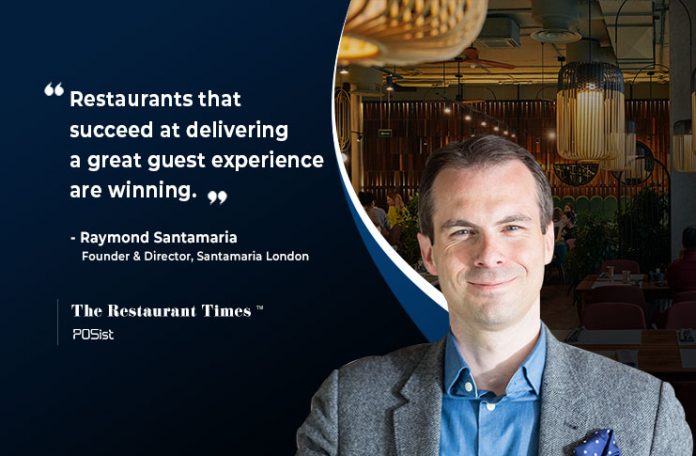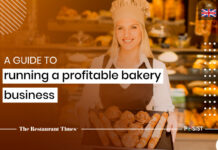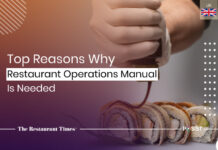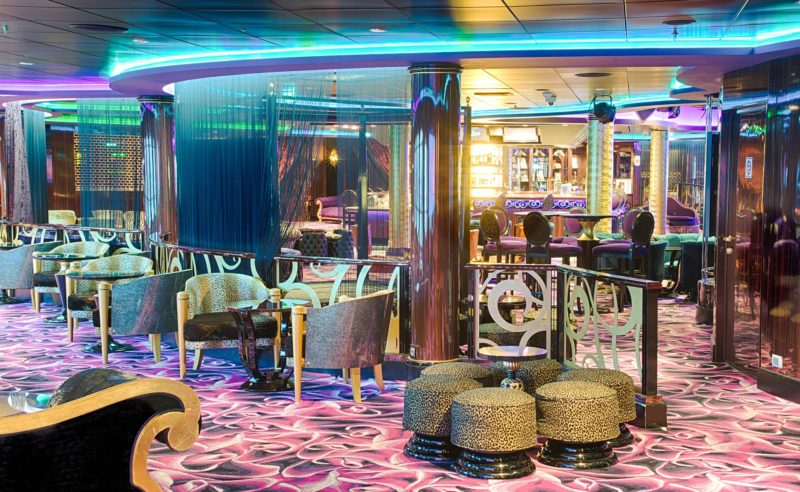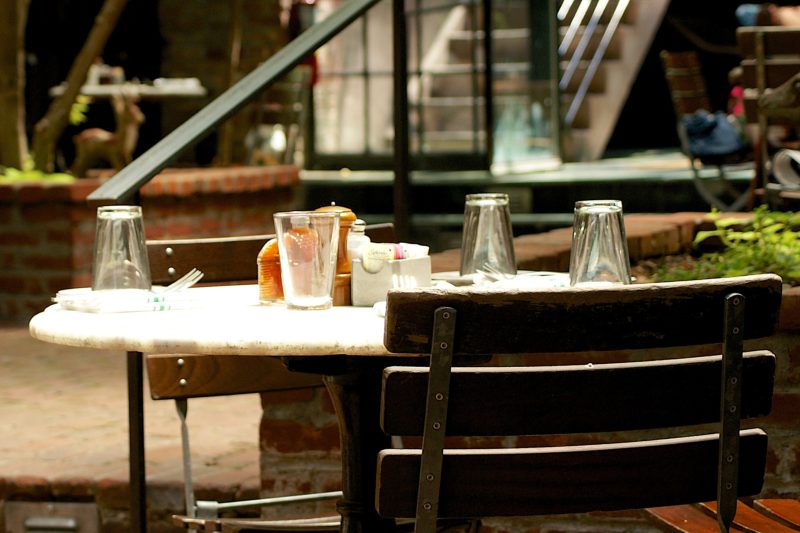With a career in F&B, hospitality & retail spanning more than 25 years, Raymond Santamaria founded Santamaria London, a strategic growth consulting firm in January this year. He provides consultancy & project management services to a variety of clients, acting as the de facto sales & marketing lead on their behalf. Santamaria London helps its clients strategically navigate the market & commercially drive footfall, traffic, engagement & ongoing sustainable operations.
In Conversation with Raymond Santamaria
In a candid conversation with The Restaurant Times, Raymond Santamaria talks about the smart techniques restaurants can employ to survive and grow during the COVID-19 pandemic.
Overcoming the pandemic-induced challenges
The restaurant industry has been one of the sectors that have been the hardest hit by the COVID-19 pandemic. Despite the initiatives launched by the UK government such as Eat Out to Help Out, several restaurants have either been shut down or are on the verge of closure.
Raymond believes restaurants can still survive the crisis by utilizing smart strategies to reduce operating costs and focusing on generating revenue.
“Smart operators have reduced the menu, making it much more focused, and reduced the complexity wherever possible,” says Raymond.
Adhering to the social distancing guidelines and following government-mandated safety protocols is also critical for running a restaurant, amid the pandemic. These safety measures are also essential to retain customer trust.
‘Proper spatial planning needs to be done in restaurants while still trying to create a sense of intimacy for customers. It is important to let the guests enjoy the experience, so among other things, the food presentation has to be amazing. The teams also have to be trained. You have to reassure the guests so that they feel comfortable to dine at the restaurant.’
Raymond also feels that restaurants should make an extra effort to delight the customers. ‘Add a surprise element to delight the guests. Maybe offer them a cocktail on the house, or let them sample something you’re working on. A lot of different things can be done. It’s a mixture of all these techniques that ensure a great guest experience.’
From a practical point of view, restaurant operators can talk to their suppliers to renegotiate payment terms. The UK government has been helping out the small businesses and giving grants and allowances. Small restaurants can explore that as much as possible to make sure they have the cash.
“Ultimately, the biggest costs are the rents and the rates. So, conversations need to happen with the landlords. Some landlords are not supportive, and that’s where businesses are shutting down. Others are being much more realistic and provide support. You have to do whatever you can to survive.”
“And all of these have to be done along with marketing. You cannot forget about marketing.
A brand gives a level of reassurance and puts the customers at ease that the team is taking care of the protocols. This is why marketing is critical to winning the customer trust.” adds Raymond.
Take On Eat Out To Help Out
Amid the COVID-19 pandemic, the UK government launched the Eat Out To Help Out (EOHO) scheme. The economic recovery measure was designed to support hospitality businesses as they reopened after the lockdown in the country. The scheme has been hugely successful with restaurants claiming more than 100 million meals, as per the Treasury figures.
Raymond also applauds the initiative by the UK government. He believes that it has helped out restaurants not only survive during the pandemic but also provided avenues to build customer trust.
“It’s a savvy way to get the people to go out into the public again. It has been hugely popular and positive. It has also put a strain on the restaurants, and they have struggled with the sudden demand while accommodating the social distancing guidelines.”
“But, it’s better to have an over demand and have people wanting to come back more and be reassured. This way, you get the chance to bring them back again. Some operators also extended it on their own after the scheme was over.” says Raymond.
How COVID-19 Is Impacting The Menu And Consumer Trends In the UK
COVID-19 has led to a lot of changes in consumer trends. Smart restaurant operators are adapting to dynamic demands. They are pushing a lot of innovation not just in terms of food, but the overall ambience and decor.
“People are seeking indulgence. So, they are splurging wherever they can. An awful lot of innovations are happening and not just in terms of food. Restaurants are focusing on the interior, the overall vibe, and the energy to attract customers, and are amazingly successful.”
On the other hand, veganism and healthy food options are becoming increasingly popular. People are more health-conscious than ever now. Restaurants quickly adapting and catering to this demand are doing tremendously well.
“And it’s not just about the cuisine; the restaurants that succeed at delivering a great experience are winning,” emphasizes Raymond.
Growing Prominence Of Online Food Delivery
The COVID-19 pandemic has fueled the already growing demand for online food delivery globally.
In the UK restaurant industry, dark kitchens and its many variations such as shared kitchen spaces are becoming increasingly popular. They have the facility and the kitchen, even a marketing team to promote the brand, and you have to just run the place. The Dark Kitchen business model allows restaurant operators to experiment with multiple brands and concepts with exceptional ease.
“New brands and concepts are being launched. Brands that have never had a high street presence are popping up on delivery channels. And these brands are getting popular to a stage where they are opening up a brick and mortar restaurant. At the same time, brick and mortar restaurants are turning into dark kitchens. This is an exciting time!” says Raymond.
However, the dark kitchen business model, lucrative as it may seem, also faces several challenges. For instance, high margins charged by the online food ordering and delivery platforms eat into the profit margin of restaurants.
“The problem with home delivery is the cut. Paying delivery companies 20% is not easy, and you cannot increase the markup as most people won’t buy it. But, it gives you the opportunity to build an audience, so I would recommend that operators try delivery. It’s more about survival right now.”
In such times when customers are concerned about hygiene and health standards, building credibility is incredibly important. This becomes even more difficult when you don’t have a Front of the House and a team that has been trained to deliver hospitality and build customer trust.
“What slightly concerns me is the traceability, the hygiene practices, and the credibility behind some of these brands and concepts. It only takes one case of allergens to damage the reputation. So, safety has to be of paramount importance.”
Ensuring proper safety standards and getting the word out about the measures you are taking to ensure hygiene is essential for dark kitchens.
“Hotel kitchens are a great space for running dark kitchens, they have a large space, and they comply with the safety standards and hygiene,” adds Raymond.
How Technology Is Shaping The UK Restaurant Industry
Technology has emerged as a significant enabler in current times. A lot has already be achieved with the help of technology such as scanning the menu, sending the orders directly to the kitchen, taking reservations.
Raymond also believes the AI in restaurants is doing wonders for the business. “AI is coming up quite strongly. There are platforms that predict guest flows and fluctuations, help in controlling the wastage, and modelling the business the right way. These are specifically designed to lower your costs; be it labour or material.” he adds.
On the consumer side of things, technology is automating a lot of processes, according to Raymond. You can capture your guest data, and preferences and develop specifically tailored offers, and run smart marketing campaigns to attract and engage with customers further.


